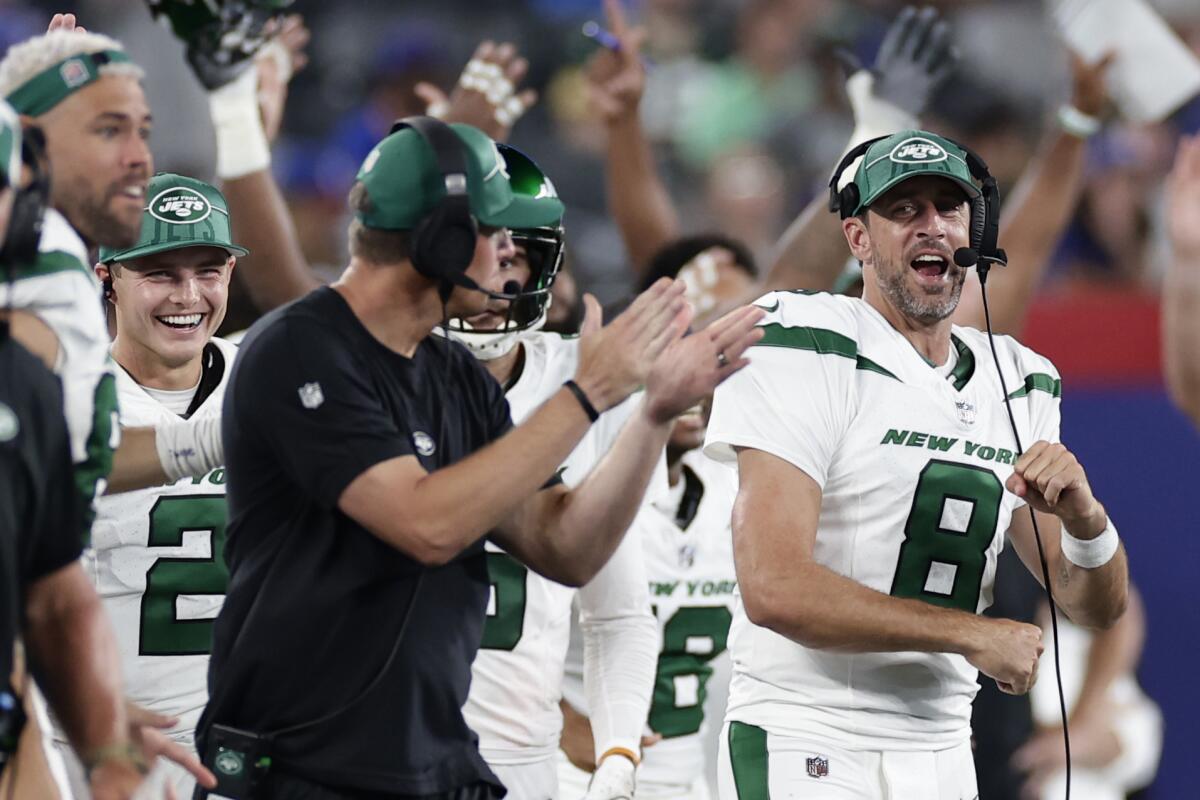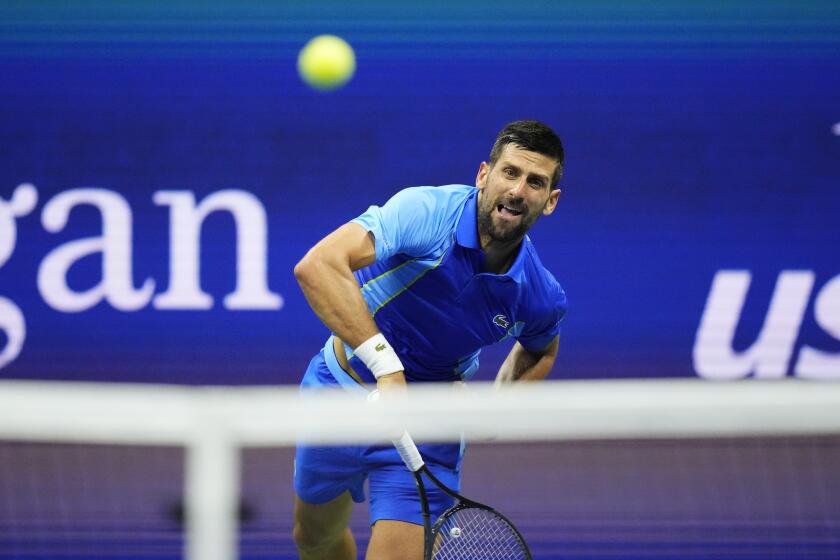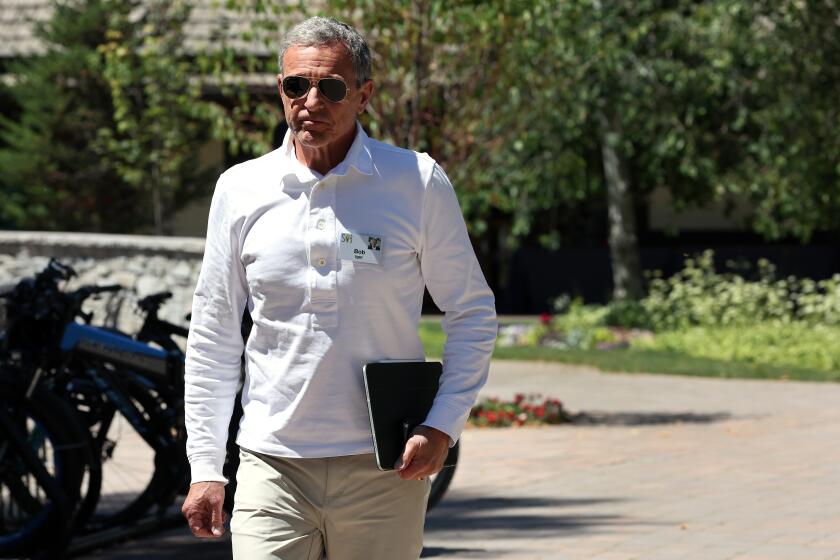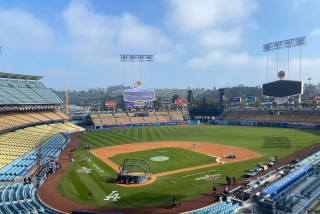Disney and Charter end blackout, returning ESPN and ABC to Spectrum TV

- Share via
Following a more-than-10-day ESPN and ABC station blackout that infuriated customers and threatened to accelerate the demise of the cable bundle, Walt Disney Co. and cable giant Charter Communications reached a truce that restored Disney channels to the Spectrum pay-TV service.
The companies announced a new agreement Monday that requires Charter to pay higher fees to distribute Disney programming. The cable company gained the ability to provide Disney’s ad-supported streaming apps — including Disney+, Hulu and ESPN+ — along with Spectrum’s television service. Charter eventually will be able to offer the ESPN channel as a streaming add-on when Disney takes that service directly to consumers.
Some analysts had warned that a failure to resolve the dispute would have expedited the unraveling of the traditional pay-TV bundle. Charter’s chief executive, Christopher Winfrey, said early on that his company was prepared to “move on” from carrying Disney channels, which would have marked a major disruption in the entertainment landscape — and diminished Disney’s clout.
But in the end, executives on both sides wielded tremendous leverage — and they worked together to hammer out an agreement that preserves the cable bundle for now. The deal acknowledges that the way that people watch TV has quickly evolved into a system in which on-demand options through streaming apps have become more popular with consumers than traditional linear channels.
Even sports fans, who’ve long been the glue holding the cable bundle together, have embraced different ways to watch their favorite teams.
Dana Walden, co-chairman of Disney Entertainment, acknowledged that the two companies each made trade-offs to facilitate a deal.
“This is the most modern deal that we’ve ever done,” Walden said in a brief interview Monday. “It’s an innovative and first-of-its-kind agreement and it took some time to iron out where the greatest value was for each company.”
The carriage fee dispute means that millions of Spectrum customers will go without “Jeopardy!,” U.S. Open tennis coverage and football on ESPN. The cutoff coincided with the start of a highly anticipated college football game between Utah and Florida.
Disney, which has long been the industry’s most powerful programmer, ceded ground by giving up its demand for Charter to carry its entire portfolio of more than two dozen linear TV channels. Eight networks, including Freeform and Disney Junior, were dropped from Spectrum’s lineup, in a significant compromise by the Burbank entertainment giant.
Nineteen Disney channels will be available in Spectrum packages, including Disney-owned ABC stations, such as Los Angeles’ KABC-TV Channel 7, entertainment channel FX, National Geographic and the Disney Channel, which provides children’s programming. But much of Disney’s kids and young-adult programming will be provided through the ad-supported, basic version of the Disney+ streaming service.
Disney’s entire lineup of ESPN sports channels will continued to be offered in Spectrum packages distributed to 14.8 million homes — a big win for Disney, which has signaled that ESPN will be a key part of its future.
Charter secured the ability to sell Disney’s streaming apps to its millions of additional customers who receive only Spectrum broadband internet service. Early in the negotiations, Charter had demanded the ability to offer those apps for free to its broadband customers — but Disney refused to bend on that point.
Instead, Charter said in a statement that it would offer Disney’s direct-to-consumer services to its customers “for purchase at retail rates.”
“We viewed the core of this dispute centering around how each of these legacy companies would participate in the economics of the future business model and its importance of how contracts will be established across the entire industry,” Guggenheim Securities analyst Michael Morris wrote Monday morning. “We believe that today’s deal reflects a trade-off from linear economics, but positions both Disney and Charter to drive value amid the shift toward streaming in a digital future.”
Executives for the two companies worked throughout the weekend to reach a comprehensive pact before a highly anticipated “Monday Night Football” matchup on ESPN featuring quarterback Aaron Rodgers leading his new team, the New York Jets, against the Buffalo Bills.
Sports fans in New York, Charter’s largest market, have been eagerly awaiting Rodgers’ debut in a green-and-white uniform. With the popular quarterback’s switch from the Green Bay Packers, the Jets are expected to field their strongest team in years. The game between two New York teams took on added significance — as it was played on the 22nd anniversary of 9/11.
ESPN, ABC stations, FX and other Disney-owned channels are part of a high-stakes blackout affecting 14.8 million Charter Spectrum customer homes.
Spectrum customers nationwide had been shut out of ESPN’s coverage for much of the U.S. Open tennis championships in Queens, N.Y., as well as college football games. Subscribers in Los Angeles, San Francisco, Fresno, New York and Philadelphia missed “Jeopardy!” and “Wheel of Fortune,” as well as ABC news programming by their local stations.
The blackout began late Aug. 31 with a blue screen replacing some of the nation’s most popular programming. The feeds were restored Monday morning.
“Our collective goal has always been to build an innovative model for the future,” Disney Chief Executive Bob Iger and Charter’s Winfrey said in a joint statement. “This deal recognizes both the continued value of linear television and the growing popularity of streaming services while addressing the evolving needs of our consumers.”
Pressure had been building for the two companies to reach a resolution. TV viewers were missing favorite programs and were hunting for alternatives to Spectrum. Politicians had become vocal about the companies withholding content from consumers.
“It’s simple: If you pay your cable bill, you deserve to get the services you pay for,” New York Gov. Kathy Hochul said in a statement Friday, urging the companies to end their dispute “as soon as possible.”
Early in the dispute, Charter had provided customers who complained about the channel outage with a $15 credit. By last weekend, Charter was steering fuming customers to streaming service Fubo TV and Disney was promoting its Hulu+ Live TV service.
The governor on Monday praised the two sides for compromising. “I’m pleased that Disney and Charter have resolved their corporate dispute and resumed service for more than 1.5 million New York customers that lost access to ESPN and Disney-owned channels,” Hochul said.
Charter executives went into the negotiations insisting that Disney provide it with more flexibility in how it carries Disney-owned channels, including ESPN, which is already the most expensive channel available on cable.
Charter executives also were concerned by Disney’s plans to offer the main ESPN channels — with football and other marquee matchups — directly to consumers in the next couple of years, which would position the company as one of Spectrum’s biggest competitors in the video channel space and potentially lead to an exodus of Spectrum customers who are sports fans.
“After years, or decades, where programmers like Disney had all the leverage, this time the shoe is on the other foot,” prominent cable analyst Craig Moffett of the MoffettNathanson firm wrote Monday in a note to clients. “Charter now has all the leverage.”
The new deal solves several issues for Stamford, Conn.-based Charter and maintains an important revenue stream for Disney at a key time.
Charter said it planned to pay Disney $2.2 billion this year in programming fees — and those payments will continue.
While the loss of Freeform might upset some TV viewers, both companies made the calculation that younger viewers increasingly were watching video on demand. The long-term viability of the linear Freeform channel remains unclear because Charter is the nation’s second-largest pay-TV provider and other distributors could follow Charter’s lead.
Charter will include the ad-supported Disney+ app in the Spectrum TV Select Video Package, which will help Disney reach an additional 9.5 million subscriber homes. That should help Disney+ ramp up that version of service and pull in more advertising revenue.
Charter will have the “flexibility to offer a range of video packages at varying price points based on different customer viewing preferences,” the two companies said in their statement.
Insider Intelligence principal analyst Paul Verna called the outcome a “draw.”
“Both parties had a lot to lose by a protracted battle,” Verna said. “Disney certainly had a lot to lose — they couldn’t afford to lose the $2 billion in carriage fees that Charter pays and they didn’t need any additional PR headaches. And Charter may have been bluffing when they said they were prepared to walk away from the cable business. They are still very much invested in it.”
Both Disney and Charter also pledged to crack down on password-sharing by streaming service customers that allow friends and family members to watch without paying.
Disney shares rose about 1% to $82.52. Charter shares climbed nearly 3.2% to $435.84.
The compromise, in many ways, simply kicks the tensions between streaming and linear TV models down the road, Verna said.
“There’s too much inertia in the pay-television ecosystem for it to just go ‘poof,’” Verna said. “It’s going to be several more years before people say, ‘OK, we’re done with cable TV.’ It would have been too drastic, too sudden and too soon for cable TV to just go away.”
Staff writer Stephen Battaglio contributed to this report.
More to Read
Inside the business of entertainment
The Wide Shot brings you news, analysis and insights on everything from streaming wars to production — and what it all means for the future.
You may occasionally receive promotional content from the Los Angeles Times.













